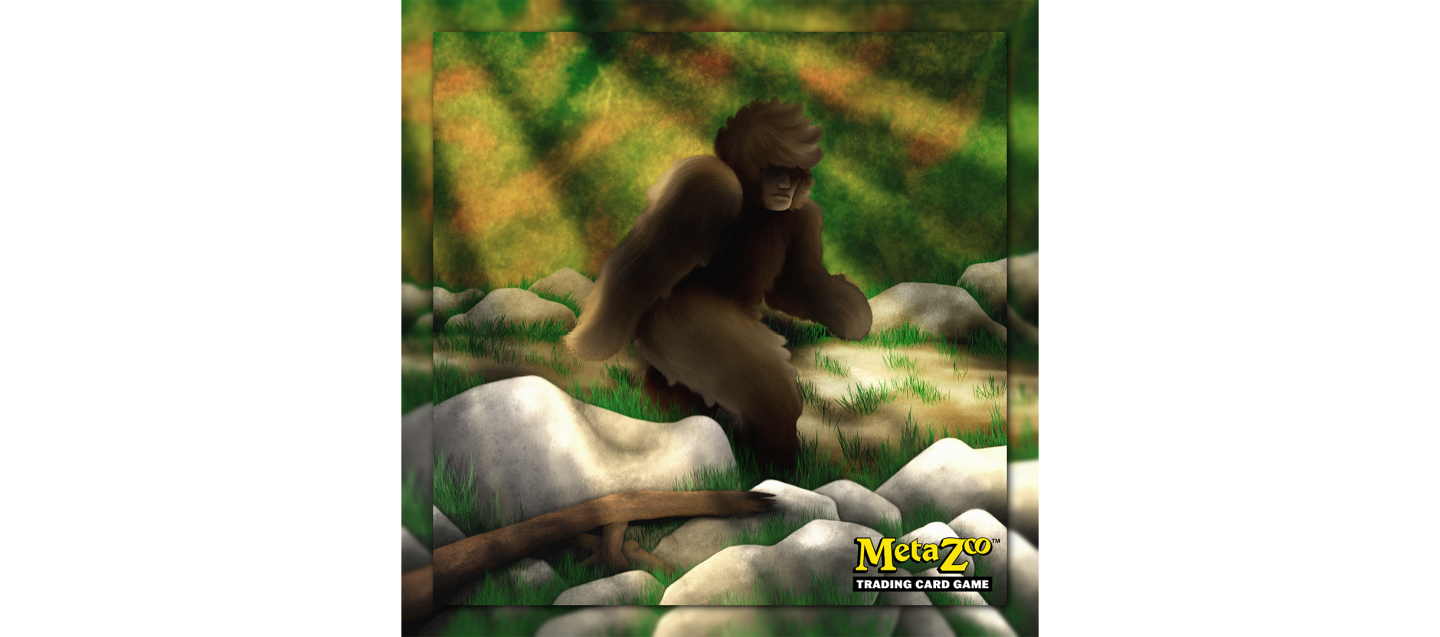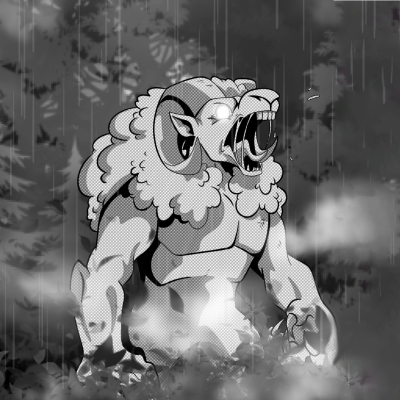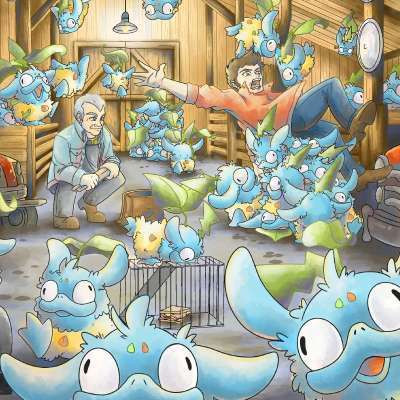From the Archives
10: A Tale of Bigfoot, or Don’t Think of Bigfoot
The uses for a mapped cryptid are more than one might suspect at first blush. I’ve seen them used to amuse, to terrify, and to threaten. But every once in a while, I come across a story about a creative use for one, and, as when you read a good book or hear a good joke, you think, I wish I had thought of that. This is one of those stories. Only 992 to go.
Don’t Think of Bigfoot
If someone tells you, “Don’t think of an elephant,” you cannot not think of an elephant.
—George Lakoff, paraphrased
“Idiots,” Aria Wright says to the bank’s branch manager. “They’re idiots.”
The manager, who is too young to be handling any money beyond his allowance, looks up at her over his laptop. “Well, they did figure out how to hack your account, Ms. Wright.”
Aria smiles at him. It’s a predatory smile. She gestures with her hands as if she’s playing the piano. “Tap, tap, tap, Brian. Find my money, please.”
***
They call themselves the Crew after Jerry Crew, the construction worker who discovered the first Bigfoot tracks in the late 1950s. Aria finds them fairly easily, at least compared to her hunt for Bigfoot itself. Spokane police have investigated the group for bank fraud before, and though the various reports don’t use the exact word, Aria recognizes the allusions to a cult when she sees them. Most of the members, she discovers, are from Idaho, including the cult’s leader, with a smattering of Washingtonians and Oregonians thrown in for flavor. They number about forty in all. One of them is a hacker. He’s one of the Idahoans.
She has an ex from Idaho. He was equally reckless with her money. She wonders if financial crimes are a rite of passage to live in the Spud State.
She goes to see J. Ford James, a real estate agent in Airway Heights, one of the Spokane suburbs. He’s middle-aged, well spoken, and slick; everything he says sounds like a lie but said with such sincerity that she almost wants to believe him. That explains why he’s the cult leader.
They meet in the lounge of one of the two tribal casinos, an elegant place currently beyond her ability to afford. J. Ford James arrives wearing a black three-piece suit, though it’s close to 90 degrees, no tie, and he hands her a business card thicker than a credit card. His hair is oiled back. He’s short and lanky but comfortable in his skin. He has a deliberate, permanent five o’clock shadow. She would think he was attractive if his followers hadn’t stolen just over fourteen thousand dollars from her checking account.
What she would like to say: You and your twits owe me restitution.
What she does say: “I’d like to join your institution.”
“Why, you must mean Windermere Real Estate,” J. Ford James says with a voice drenched in molasses, “and I am just one of many who could introduce you, madam, provided you have your license, of course.”
“No. That’s not what I meant. I saw Bigfoot last summer. At Mount St. Helens.”
This assertion does not give him pause. “You and a hundred others, I’m afraid. I suppose you must’ve read about us in the media. Was it that Newsweek exposé?”
“Keeping Tabs Weekly.”
J. Ford James barks a laugh. “A paper for the toilet, and I do not mean for reading. You will forgive me if I excuse myself now. It has been a pleasure to meet you, I’m sure.”
Aria was expecting this reaction. She says, “I can prove it.”
When he cocks an eyebrow and adopts a wry, patronizing smile, she knows she has him. “Murgur.”
His smile remains intact, but his eyes betray his surprise at the sound. It’s less a word, more a grunt, and she knows you have to have heard it to imitate it. She wonders, then, how he first heard it—if he’s actually seen Bigfoot himself, if he’s a Caster like she is.
That would ruin her plan.
***
“Murgur.”
When she finally found Bigfoot—after more than a week of trekking through the wilderness in southern Washington State—it was hiding in plain sight. She didn’t think of it so much as camouflage as an almost supernatural ability to convince you to look another way and thus never see it. As a Caster, she’d seen quite a few creatures that adopted different methods to not be noticed, many of them quite effective—after all, cryptids hadn’t been scientifically proven to exist, and that was in large part due to their abilities to remain undetected by the masses. In this instance, there was a thicket of pine trees, and when she glanced away and then glanced back, there was a thicket of pine trees with a sizable hair-covered beast crouched down in the center of it, watching her from a distance.
Once she’d spotted it, Bigfoot made no effort to hide from her anymore. In fact, after tracking it across dense terrains of undergrowth and open areas that hadn’t fully recovered from Mount St. Helens’ eruption over forty years ago, she realized it probably wasn’t trying to evade her. It was just nomadically doing whatever it is a Bigfoot does, she decided.
“Do you speak?” she asked from a healthy distance. She pulled out her spellbook, which contained the blank cards she could use to map Bigfoot and mix a microcosm of its essence with her own to essentially duplicate it onto the card, making it readily available for her to access afterward. The actual Bigfoot could then wander down to Santa Monica, for all she cared.
Bigfoot hunched over on its forearms, bringing its head down to her height. Its scowl made her think of gorillas in the zoo: angry, confrontational, and barely constrained from launching itself at the hapless fools staring at it. She felt sweat soak the hair at her temples—she flew a Cessna 310 with modified landing gear as a hobby, and at this exact moment, she wished she were ten thousand feet above this encounter. Oddly, she wondered if Bigfoot could jump that high and snag her right out of the sky.
“Murgur?” it said.
Murder? she thought, harnessing her panic. Then Bigfoot repeated the sound, and she could hear the distinction. She spread her hands in what she hoped the cryptid found to be a disarming gesture. Swallowing, she repeated the word back to it in the same tone: “Murgur?”
Bigfoot grunted enthusiastically and rose back to its full height. Seconds later, it had crossed that healthy distance between them and scooped her up in its arms, crushing her with its affection.
“Murgur,” it repeated, and when she could loosen herself enough to breathe again, she repeated it as well. They then proceeded to chant it together in what Bigfoot clearly found joyous and what Aria found reassuring.
***
J. Ford James’s reaction convinces her that the real-estate-agent-turned-cult-leader knows it’s a word associated with Bigfoot but doesn’t know what it means. His surprise and eagerness tell her that he’s no Caster, either—he’s never actually seen Bigfoot in person. He’s too naïve for that to have happened.
“Very few beyond myself know that word,” he says, recovering his sense of self-importance. “May I ask how you came across it?”
“I told you, I saw Bigfoot.” She smiles winningly at him. “It means ‘friend,’ if you’re wondering.”
“So I am aware.” James is not aware, of course; she can read the lie in the way he licks his lips. “If you’ll indulge me, how did you come to that conclusion on your own?”
Now it’s her turn to lie. “Because I caught it. And then, eventually, it told me.”
J. Ford James’s gentlemanly hospitality vanishes, as she suspected it might—she just revealed to him that she’s holding prisoner the object of his cult’s slavish obsession. He stares at her as if she speaks heresy, so she knows it’s time to set him up.
“I can bring it to you,” she says. “Bigfoot. You know, I want to be part of the Crew, your people. I can tell all the rest of the Crew what else I’ve learned from Boojum so far.” When he twitches, she adds, “That’s its real name.”
It’s not—she read that in a book about Smoky Mountain Cherokee myths—but it adds to J. Ford James’s accelerated acceptance of her story. He reaches out and touches her arm as if they’re especially good friends, which they’re also not.
“You’re an apostle,” he says. “You somehow received my message across time and space, and you did as I asked: You found Boojam and brought him to me. You are as magical as it is. You will be more than welcome to be part of the Crew. You must come to us this Saturday night and bring Boojam with you. We will make you our first apostle, but you will tithe as little or as much as you please.”
She ignores his consistent mispronunciation of Bigfoot’s fake name, and she resists the urge to note that she’s already tithed fourteen thousand dollars straight from her account to J. Ford James’s. Pointing out either of these could get her uninvited to Saturday night’s cult club.
She says she’s ecstatic, and she can’t wait for the entire Crew to meet Boojam.
***
After mapping Bigfoot on Mount St. Helens—it waved goodbye to her as she headed back to the trail and, soon enough, to the field where she’d hidden her Cessna—she’d not thought much more about it. She tested the card to ensure she could summon up her mapped version if she wanted to, and when that worked just fine, she put it away and went south to Medford, Oregon, in search of cryptids called Shmoos. After finding them and adding them to her spellbook, she headed to Seattle, where she’d heard tell of something living in the city’s so-called Underground.
But after learning she’d been bilked out of every penny in her checking account, and then having a prepubescent bank manager named Brian tell her that the Crew in Spokane was likely behind the theft, she thought once again about the mapped Bigfoot in her spellbook.
She read up on the Crew—including the Newsweek article, but she wouldn’t give J. Ford James the satisfaction of knowing—and their cult-like veneration of “the missing link” and the secrets of the past they thought it could share. They called it “magic.” There were no women in the Crew, she learned, either because they couldn’t fulfill the cult’s insistence that all members grow their facial hair as long as possible to resemble their totem creature or because they were too smart.
She also read that J. Ford James’s little brother, Jim, was their tech. He had a master’s in cybersecurity from Carnegie Mellon. He was suspected of myriad cybercrimes but had never been charged. One article described him as “eccentric”—the nice word for “psychotic”—in his belief that Bigfoot merited worship. The article in the tabloid Keeping Tabs Weekly suggested he intended to marry Bigfoot and have a bunch of Littlefeet. This person, she found it hard to believe, was the nutjob who had successfully stolen her life savings. “Littlefeet,” for crying out loud.
She called forth the Bigfoot she had mapped. It appeared before her, physically indistinguishable from the real thing but prepared to follow her commands. Then she implemented her test: she handed her Bigfoot a fist-sized rock and instructed it to hang onto it as tightly as it could. When it acknowledged it would do so, she dismissed it, sending its essence back into the card from which it came. Bigfoot vanished.
The rock clattered to the ground.
“Okay, idiots,” she said aloud, “I’m coming for you now.”
***
The Crew meets in what she believes is a former Knights of Columbus hall, now devoted to a different religion entirely. It’s far too big for just forty of them, but she reminds herself about beggars and choosers.
She moves among them, and they meet her eye with disdain, dismissiveness, and distaste until word gets around that she’s going to bring Bigfoot to them, and then suddenly everyone is okay with a woman in their midst. She decides that most of them look like unkempt people living under a bridge, their beards undoubtedly havens for insects and small rodents. Only J. Ford James has a trimmed beard and coiffed hair.
He leans in close to her, smiling outwardly at his followers. “Did you bring it?”
“Yes,” she says. “It’s right outside the emergency exit at the back, waiting.”
J. Ford James looks like he might swoon. He really believes in his own cult, she decides with some surprise. Boy, is he in for shock.
While he moves around the hall greeting his fellow cultists, she goes to the exit and stands guard so no one tries to sneak a peek. She has already called forth her mapped Bigfoot, and it obediently stands outside in the alley in the dark, scratching itself and picking mindlessly at its scalp. While she waits, she takes out her phone and checks her bank account online. As promised, the bank has refunded her stolen money, all fourteen thousand, and has now moved her case over to the fraud department for further investigation.
She hesitates for just a moment, wondering if she should reconsider what she’s about to do, but then she hears J. Ford James calling to her in a voice filled with rapture, and she shrugs off her pity. She pushes open the door, picks up a paper bag from the farmers’ market she visited this morning, and thrusts its sole content into one of Bigfoot’s hands.
“Behind your back, murgur,” she whispers, and it complies.
As she leads it in, the Crew gasps as one. They all stare up at Bigfoot, enthralled. They begin to chant gibberish, though she hears the word murgur sprinkled liberally in what she imagines are prayers, and they run their fingers through their beards, pull at their own long hair, tug at the sideburns that accompany the rest of their facial hair.
Yep, she thinks. A cult.
She spots J. Ford James’s little brother Jim among the ones nearest to her Bigfoot; she recognizes him from the tabloid article.
“You don’t look married yet,” she says to him as she passes him. He just looks confused.
And then she has her Bigfoot in front of the hall, where she has it stand in such a way that they can’t see what it holds behind its back. It looks out over them, bewildered, as she clears her throat and takes a big breath. She moves away, toward the emergency exit she brought it through, and takes out the card that her Bigfoot comes from. Then she feigns desperate panic as she begins to shout from the sidelines at the men in the Crew.
“No!” she cries out. “What are you all doing? Don’t you know it knows what you’re thinking? It reads your minds! I know you’re all from Idaho, but you can’t keep thinking about potatoes right now! You’ll hurt it! Stop before it’s too late! Don’t think of a potato!”
She touches the card with her fingertips. Bigfoot vanishes. The two-pound Russet Burbank potato it held behind its back drops to the hall’s floor with a thud. It rolls a few inches and comes to a halt with its lumpy side up.
There’s dead silence for a half-dozen seconds. Then the wailing begins. Some of them sink to their knees, their arms outstretched toward the potato. J. Ford James’s brother Jim stands with his mouth open, making it hard for her to believe he could possibly be a crypto-criminal. And J. Ford James himself has transformed from a grown man with slicked-back hair to a whimpering child lost in a crowd. All of them are completely confused, desperate, and so she knows it’s time to wrap things up.
She touches the card again and returns Bigfoot to where it was standing just a moment ago.
One of its big feet mashes the Russet Burbank into purée.
Then she dismisses her Bigfoot again as the wailing turns to shrieks and adult men with professions and mortgages and families rush to encircle the spray of potato on the floor, their eyes rolling back in their heads as if their very mothers had been executed in front of them.
Aria Wright moves to the emergency exit.
“Idiots,” she says, looking back at them one last time. J. Ford James has mashed potato traces on his lips. “They’re idiots.”



